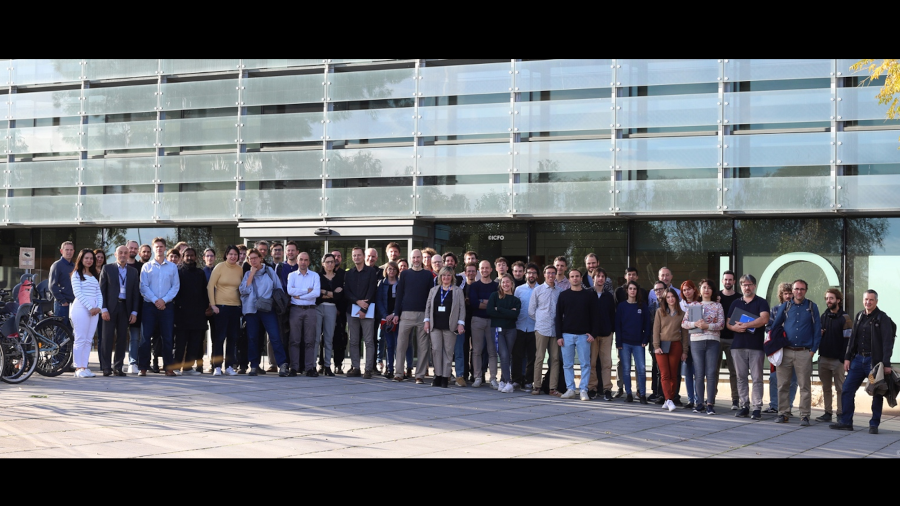Research programme in quantum communications begins with the involvement of the UAB
The programme, coordinated by the ICFO, aims to develop technologies for the future quantum internet. In addition to the UAB, the IFAE, the ICN2, the UB and the UPC are participating in the programme.

The official inauguration of the European Quantum Communication Infrastructure Initiative, in which the UAB participates alongside five other research institutes from Catalonia, took place on 23 November. The initiative aims to study quantum technologies which can be applied to a future European quantum internet network. The project will receive 15M euros in funding during the next three years, of which 9.7 million euros stem from the European Union's Recovery and Resilience Mechanism Plan through the Spanish Ministry for Science and Innovation, and 5.3 million euros from the Government of Catalonia through its Ministry for Research and Universities.
Participants in the European programme include the Institute for Photonic Sciences (ICFO), the Catalan Institute for Nanoscience and Nanotechnology (ICN2), the Institute for High Energy Physics (IFAE), the University of Barcelona (UB), the Universitat Politècnica de Catalunya (UPC) and the Universitat Autònoma de Barcelona (UAB).
Valerio Pruneri, ICFO researcher, leader of the European Quantum Communication programme and general coordinator of the "Quantum Communication" project, introduced the main objectives. During the event, the strategic lines of the programme were presented, emphasising the lines of action and the different subprojects that will be developed regarding the software and hardware arenas within the framework of this initiative. Several transversal projects were commented as possible first steps in achieving considerable synergies and future collaborations at a European level.
The research groups in Quantum Information and Quantum Optics from the UAB Department of Physics participate in two of the four strategic lines of this quantum communication initiatvie. According to Department of Physics researcher Anna Sanpera, "we will develop quantum software which will improve communication with quantum resources. This for example means that we can optimise data compressin, improve the capacity of quantum channels, verify and certify the best quantum resources and develop new algorithms that can guarantee a safe communication, thus contributing to the future quantum wifi".
The implementation of this project is a clear example of how advanced this area of knowledge is, a basis on which the foundations of major European initiatives are being laid. This is the case of EuroQCI (European Quantum Communications Infrastructure), whose objective is to build a quantum communications infrastructure in Europe, both through terrestrial quantum connections as well as satellite connections to cover great distances and span the entire continent.
In the short run, quantum communications are of great interest in the world of telecommunications, specifically in the field of cybersecurity, to offer an additional security layer to the currently existing technologies for secure transmission of data and information over the internet. The ultimate goal is the implementation of the so-called Quantum Internet, which will connect all kinds of quantum systems, such as computers, processors, simulators and sensors, through a network capable of distributing rigorously quantum resources, such as the so-called quantum entanglement, through a conventional telecommunications network reinforced with quantum elements.
About the programme
The main objective of the program is focused on research development of concepts and technologies that are currently not commercially available, both in communications and in computing, sensors and quantum materials. Various types of hardware and software that can be integrated into telecommunications networks will be addressed. Solutions will also be sought for those technologies that are most optimal for long distances, unknown at present. In parallel, work will be done on the development of quantum repeaters and memories to achieve quantum communication through optical fibers over distances of more than 100km, which represent a scientific challenge – with no currently known solution.
At the same time, technology will be investigated for the ultra-precise distribution of time signals, for the connectivity of quantum sensors and distributed quantum computing, as well as the exploration of the properties of quantum materials, areas of knowledge in which the objectives set are in the medium run and for which continuous research development is required, given the enormous scientific and technological challenges that arise.
Transversal lines have also been established focused on the training of personnel, a training effort that puts special emphasis on the capacity for entrepreneurship which, together with the creation of an industrial ecosystem and the development of new circuits for the dissemination and exploitation of the results, aims to effectively transfer the scientific and technological knowledge from the laboratory to the market, with a significant and beneficial impact on society.
An important part of the programme is also focused on supporting technology transfer as well as consolidating and creating new technology-based companies in the field, by following the footsteps of companies created in recent years, such as Quside, Luxquanta, Qurv and Qilimanjaro, who seek to have a relevant role in the sector at a worldwide level.
The "Quantum Communication" programme is focused on research projects and will be developed in parallel to other programmes, financed mainly by the European Commission, aimed at a gradual deployment of technologies for the creation of the Quantum Internet. The first phase of the aforementioned deployment will take place throughout the decade and will involve companies from the telecommunications infrastructure sector. In Catalonia, Cellnex Telecom has a leading role in the terrestrial sector.
The UAB, with Sustainable Development Goals
Partnerships for the goals